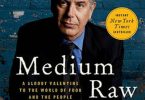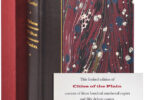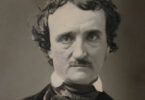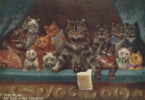
British novelist Jim Crace discusses The Pesthouse, his latest projects, and the craft of writing.
What was your initial inspiration for The Pesthouse?
The initial inspirations for my novels hardly ever resemble the finished products. If a book is going well it abandons me and starts to impose agendas of its own. That’s what happened with The Pesthouse.
I guess it all started about 21 years ago in the summer that my first book, Continent, was published. It sold–unexpectedly–for a large amount in the States, so we decided to splash out the dollars on a family holiday in the Isles of Scilly, an archipelago of mostly unpopulated islands 30 miles off the coast of Cornwall. There we discovered a tiny uninhabited island called St. Helens. It hadn’t always been uninhabited–in the 1760s an Act of Parliament decreed that any ship approaching the British isles via Scilly would have to abandon any of its passengers or crew who showed signs of any contagion (whether it be cholera or rosacea) in the stone quarantine station on St Helens until they either died or recovered. Few recovered, of course, because the innocent sufferer of acne would be sharing bedstraw with the contagious typhoid victim.
We explored the roofless remains of the quarantine station and its graveyard where the buried include passengers from Asia and Africa and a 27-year-old naval surgeon who had been sent to tend the sick but died himself within a week.
I owe a good deal to St. Helens as a writer. We have put ashore there several times every year since that initial visit. The island has always been rewarding. It contributed some of the impulses and ideas behind my novel Quarantine. The African corpse became Otto, the absentee hero of Signals of Distress. It also provided the irresistible initial inspiration for The Pesthouse, particularly the tension between High Hopes and Hopes Dashed implicit in a long sea voyage which so close to the longed for destination could just as easily end in death and disaster as safety and opportunity. It also provided a tempting title for a novel. The Pesthouse is the local name for the St. Helens quarantine station. Both the subject matter and the title went on the back burner, until I finally realised that I wanted to write a novel that investigated my, and the world’s, love-hate relationship with America.
You once described yourself as a risk-taker, which is evident in the span of plots for your novels: Christ’s forty days in the desert, a shipwreck in a nineteenth-century English coastal town, the decline of a village at the beginning of the Bronze Age, a meditation on the physical decay of a murdered couple on an American beach. There seems to be a crucial sensitivity in the balance between setting and character. Which comes first for you?
What comes first? It’s always the subject matter for me. There is always an issue I want resolved, or a question I want answered. In Being Dead, for example, my purpose was to discover if there were any narratives of comfort in the face of death for those of us who do not believe in any gods. In The Gift of Stones, the question was, How does an industrial community (such as my home town of Birmingham) reinvent itself when its labouring status has been removed? And with The Pesthouse, as I have explained, I wanted to pit my personal fondness for all things American against my loathing of current U.S. foreign policy. When I set finger to keyboard, I have very little idea of plot or setting, and no characters to work with. I just start chipping away and hope that the narrative itself will come to my rescue.
The Pesthouse in its entirety is driven by the relationship between two people, Franklin and Margaret. The future you create strips away any value in religion or technology, two popular avenues for writers who envision what lies ahead for society. We’re left only with a “faith” of sorts, based in the people around us.
Yes, I’m a sentimental atheist. I do believe in the fundamental goodness of humankind. But my optimism is always well-hidden–so well-hidden, in fact, that many readers consider me irredeemably dark and pessimistic. That’s because I always look for my optimism in the murkiest of corners where it will have had to have been strong in order to survive. My journey towards optimism is always a tough one. So it is with The Pesthouse–a punishing flight through a murderous devastated landscape finally delivers two lovers to the high ridges of America beyond which the American dream of freedom and an acre remains intact. I guess that’s faith of a sort.
You have been called a “poet of detail.” How much time do you spend crafting your sentences?
Not much time. Those seemingly polished descriptive passages come easily to me. I understand landscape and natural history and so am confident in presenting them in prose. I do not write dialogue very well, and generally make a hash of it. Then I spend hours trying to craft better versions. It never ends up better than workmanlike. So that’s the answer. I spend little time on what I’m good at, and lots of time on what I’m bad at.
Of the books you’ve written, who is your favorite character and why?
I’m fond of Otto, from Signals of Distress, because he’s off-the-page rather than fully realised. But generally I like the women in my books. Inventing them and spending time with them is my form of adultery. Yes, I like and admire Margaret from The Pesthouse and Miri and Marta from Quarantine. Each of the six women in Genesis are my kind of gal (plucky, independent, admirable for their characters rather than only their looks). I would have loved a date with hot-tempered Syl (from Being Dead) when I was younger. But if I had to choose only one, I’d go for Syl’s smart and sexy mother, Celice.
Does winning the Whitbread Best Novel Award, other awards, and being shortlisted for the Booker Prize affect your work as a writer or your relationship to writing?
I have won more than my fair share of prizes. I’m generally regarded as “the prize-winning author” rather than “the best-selling author.” I’d like both titles. But the truth is that fiction has been very kind to me. My career has been long and rewarding in every way. No complaints. But no, the prizes and the success have made no difference to the books–nor have the negative responses and the bad reviews. My books just line up, waiting to be written and with little regard for the opinions of anyone, including myself.
Forthcoming projects include The Finalist and Archipelago–working titles, of course. Would you like to provide any details on these future writings?
The Finalist is not even the working title now. It might be called Heroes or it might be called A Nervous Man. Or something entirely different. Its subject matter is the failure and timidity of western bourgeois democracy (yawn). The novel pits the Man of Reason against the Man of Action. I want to discover my true political nature. Then I will end my writing career with a final novel, Archipelago, an autobiography stitched from falsehoods and impossibilities and set -as you’d expect–in a group of uninhabited islands.
Jim Crace is the author of eight previous novels. Being Dead was shortlisted for the Whitbread Prize and won the prestigious National Book Critics Circle Award for Fiction in 2000. In 1997, Quarantine was named the Whitbread Novel of the Year and was shortlisted for the Booker Prize. Crace has also received the Whitbread First Novel Award, the E. M. Forster Award, and the Guardian Award. He lives in Birmingham, England. For more information on the author, his writings, or recent news, please visit the website for Jim Crace.






